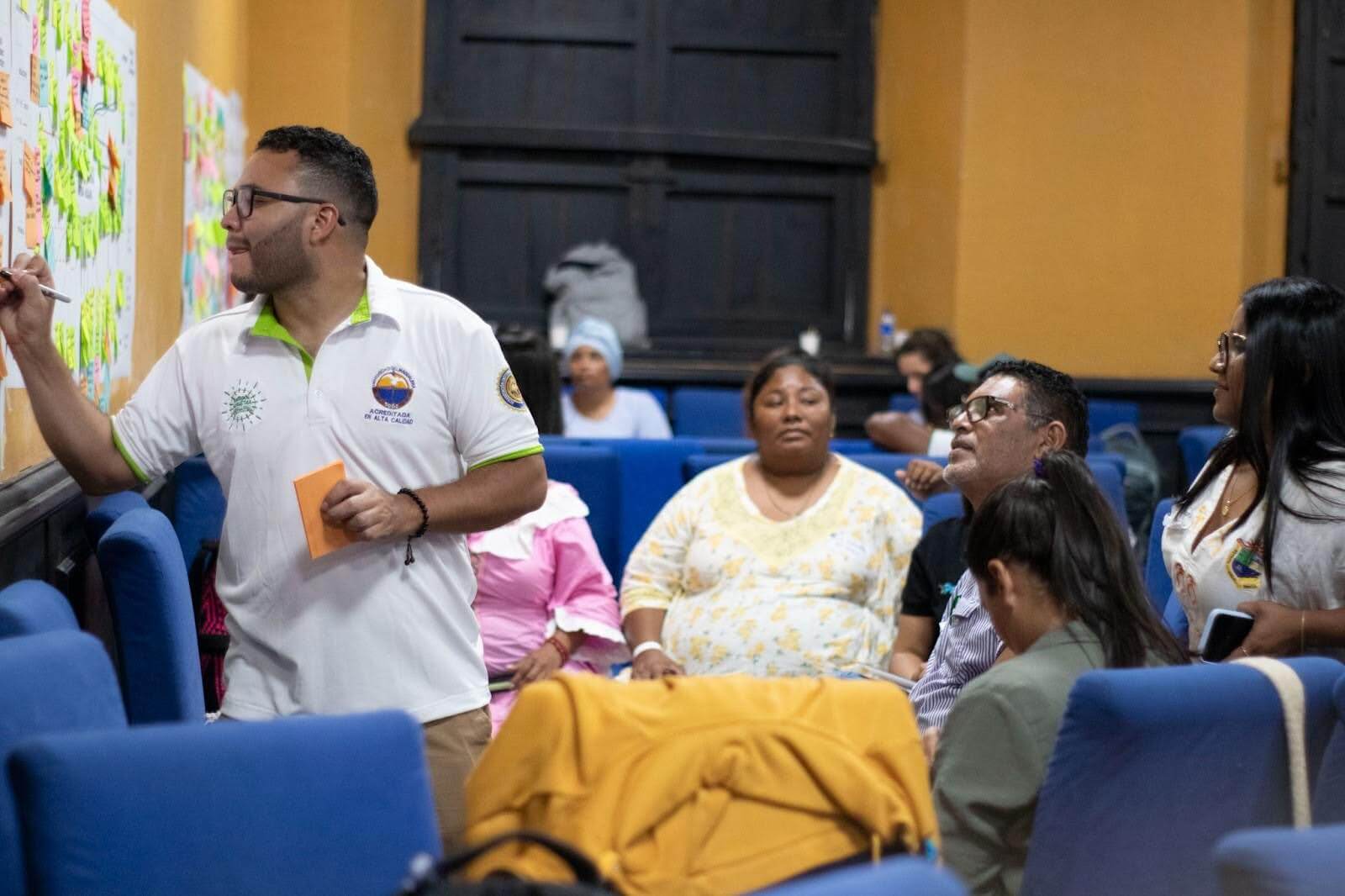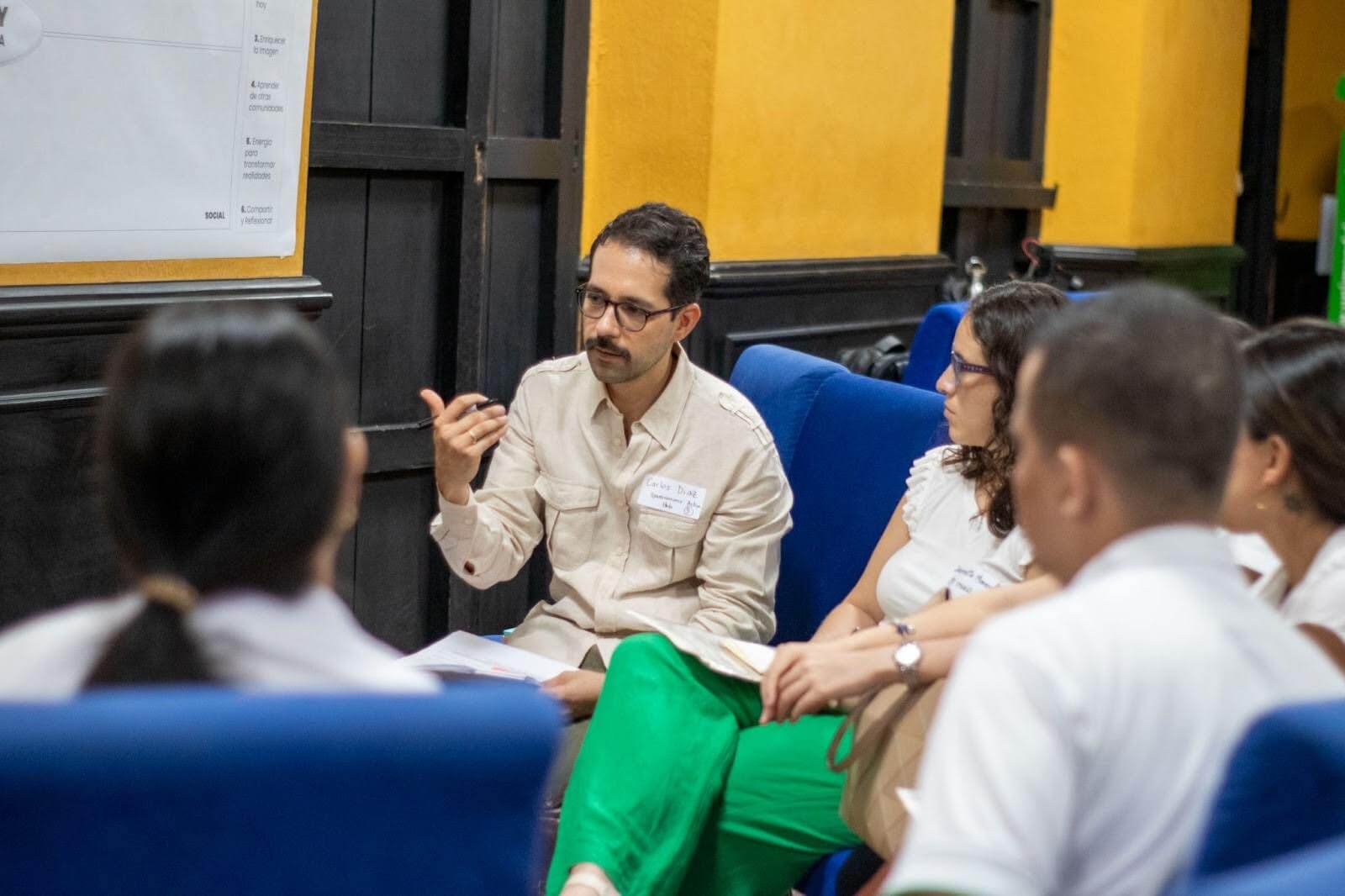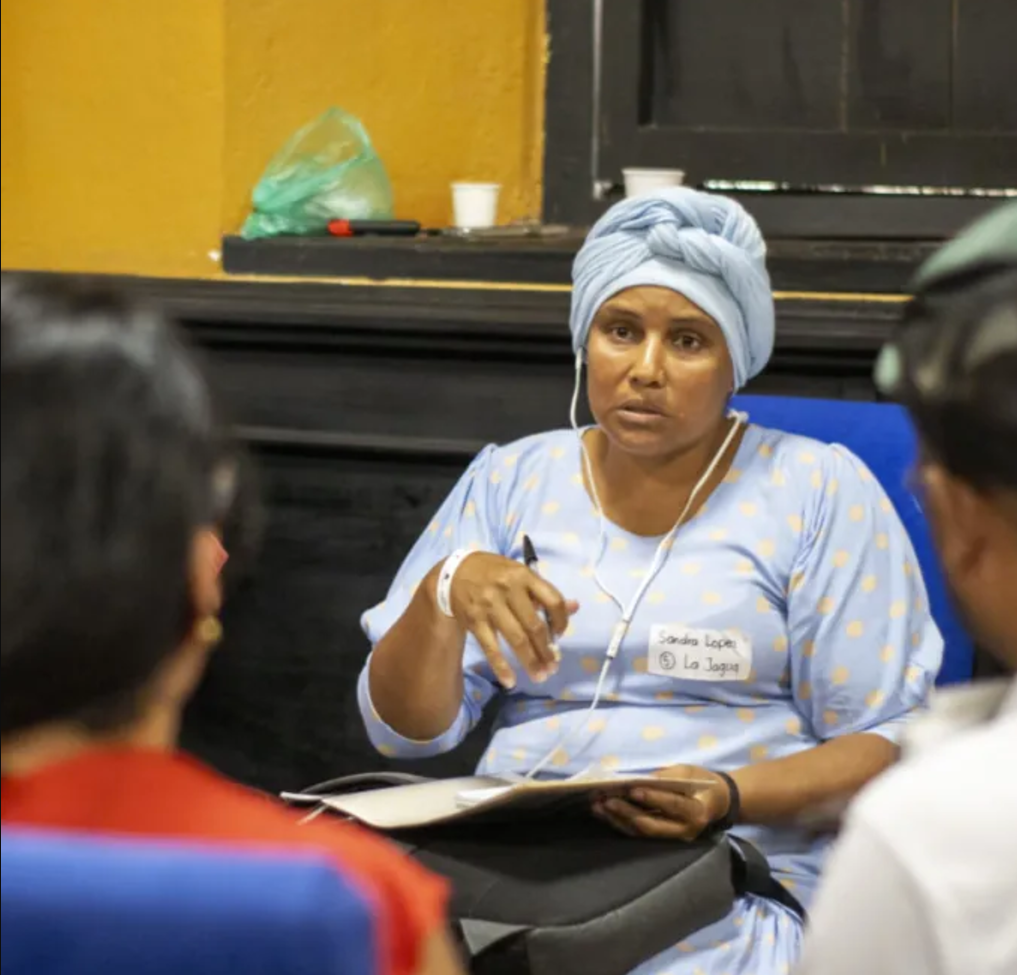Energy Communities: Collaborative efforts for a just transition
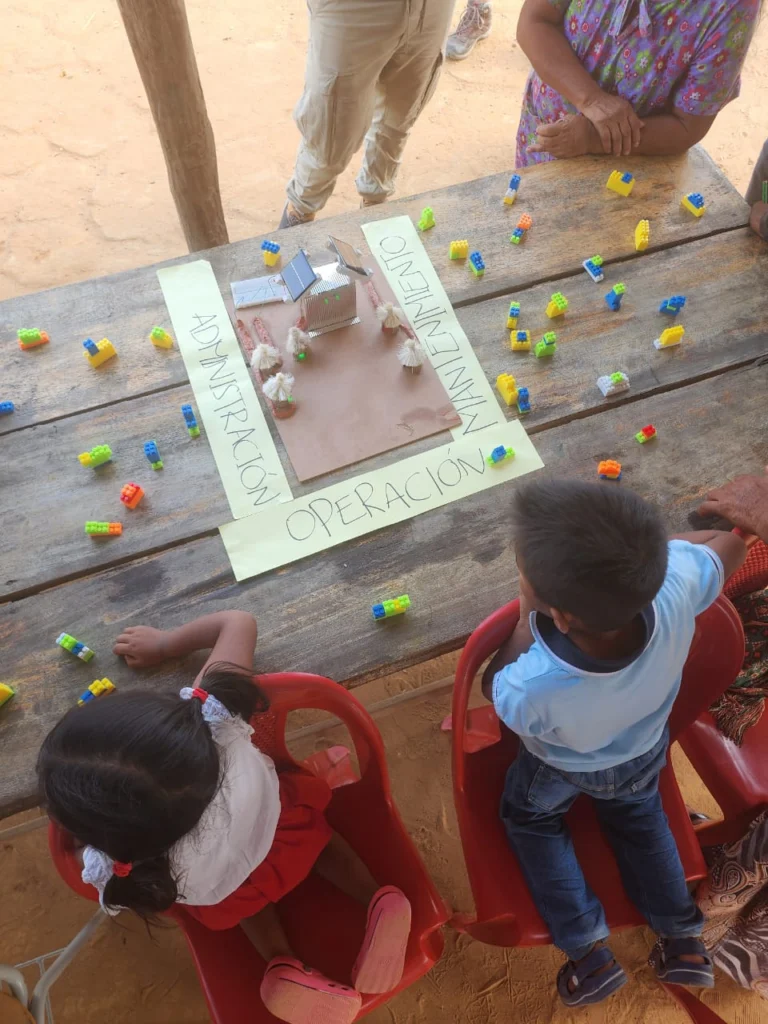
When entering it was impressive to see the room filled: over 60 government representatives, community leaders, and members of NGOs and donors. All working at both national and local levels across the mining corridor (in the departments of La Guajira, Cesar, and Magdalena), sharing their lessons and questions about the stakes in Energy Communities (ECs). All united by a common goal: navigating uncertainties towards a Just Energy Transition (JET) and co-creating a resilient vision for sustainable ECs.
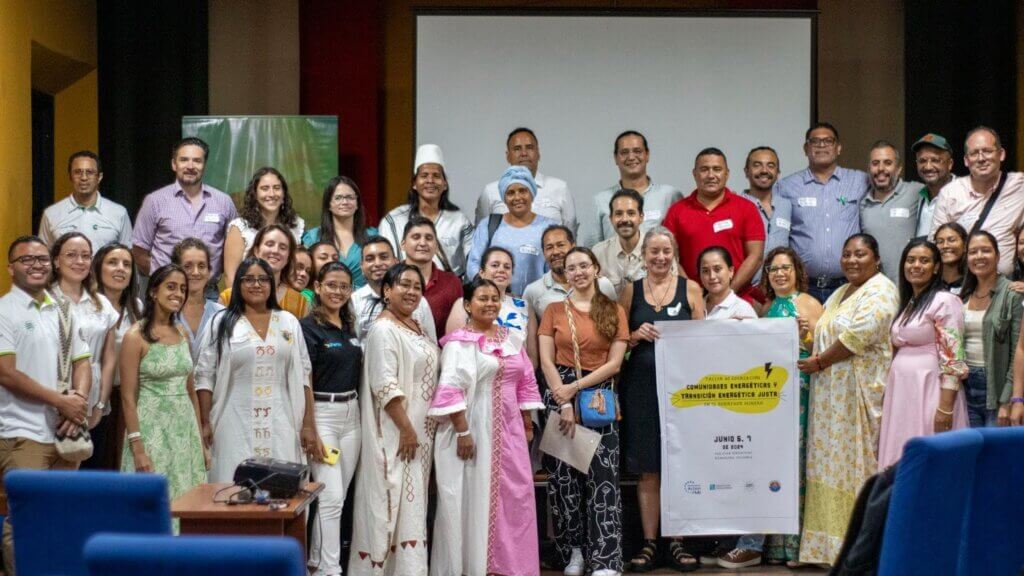
This was the atmosphere at our recent workshop co-organized with the University of Magdalena in Santa Marta, where we explored how to use systems thinking and political-economic analysis to inform our work in Colombia. We mapped out the local systems of actors and their relationships with six Energy Communities and various organizations invited. We identified the challenges, needs, and opportunities to strengthen the role of ECs in their context. We surfaced ideas on how to harness ECs’ strengths and relationships to tackle challenges in designing and implementing actions towards an energy transition, and we also identified critical factors needed to strengthen and ensure sustainable energy communities for the future.
The resulting vision
Image 1: Farid Rodríguez from the Energy Transition Hub at the University of Magdalena (left); Doris González Epieyu, leader of the community Kasipaichi 2 and Robert Correa, Coomustier (center); representative, Uribia’s Mayor Office (right). Image 2: Carlos Díaz, Governance Action Hub (center); Jeannette Moreno, INSUCO (right).
In our exploration developing the maps for each EC, we tested a participatory systems design methodology. Community leaders articulated clear visions to guide their journey and achieve a positive and sustainable impact in their territories. The communities prioritize in their visions:
- Generating economic benefits: Use energy as a means to drive local economic development and offer new job opportunities.
- Providing alternatives for subsistence and labor transition: Facilitate access to alternative sources of income and opportunities for job retraining for community members, and learn new ways of subsisting.
- Self-generating energy and reducing costs: Promote self-generation of energy to reduce electricity expenses and improve energy self-sufficiency.
- Preserving ethnic identity: Integrate technology in a way that respects and enhances cultural identity and traditional practices.
- Improve food sovereignty: Increase access to water and improve food refrigeration practices to strengthen food security.
There is a new paradigm in energy access and generation. In this video, Juan Fernando Higuita explains how people can become partners in energy projects, self-generate energy, and reduce their utility bills. Energy becomes an enabler of various processes that enhance development by offering opportunities to gain benefits and explore alternative ways of living. Understanding the current realities and daily challenges faced by the ECs led to the identification of opportunities to promote economic benefits through energy programmes and job creation. This holistic approach not only addresses critical areas such as health, education, and access to water but also strengthens community and participatory bonds. It also promotes sustainable territorial development and nurtures local leadership within the ECs.
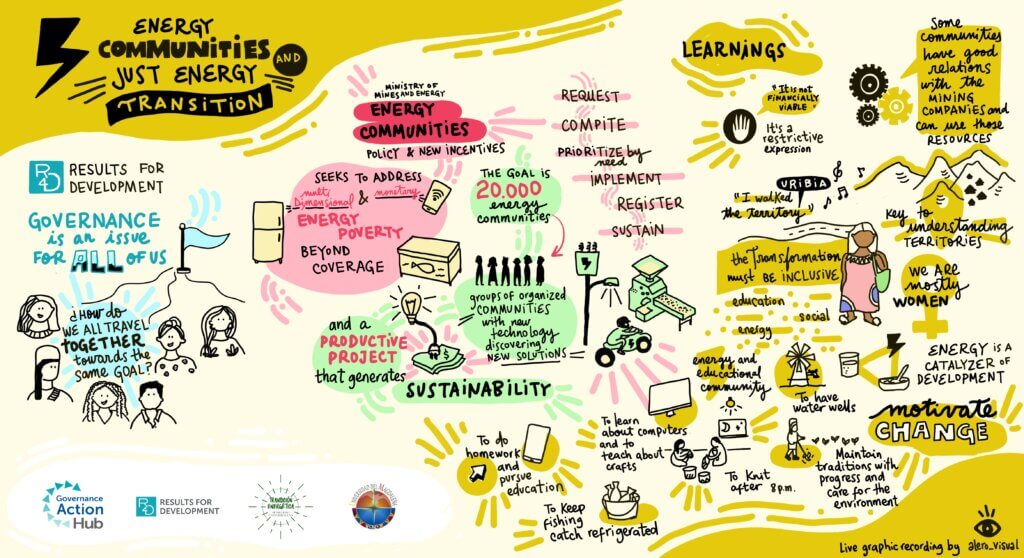
As highlighted by PARES, these visions aim to strengthen leadership, train competent leaders for active participation and foster collaborations for better governance. This comprehensive approach highlights possible action plans and commitments in an expanded network of actors and ECs to improve their external relationships and resilience.
Promoting change on multiple fronts
The Governance Action Hub’s commitment to local impact and influencing public policies towards a JET has encouraged a conversation focused on inclusive community development and empowering local actors through participatory practices.
Together, we have identified the following areas where changes need to be proposed and discussions need to be invigorated:
- Institutional relations and promotion of participation: ECs must strengthen their internal structures for community governance and enhance their relationships with public and private actors. This involves empowering leadership and ensuring the continuity of decision-making processes. Furthermore, it requires collaboration with governmental and non-governmental institutions to ensure their voices are heard and access to basic public services around the ECs is guaranteed.
- Productive strengthening for community well-being: Energy solutions can help optimize production processes. Strengthening partnerships with local businesses and implementing efficient methods for the production, storage and logistics of goods transportation can improve economic opportunities within the EC. Additionally, equipping EC members with the necessary skills can help develop and grow their business initiatives.
- Social resilience to address territorial challenges: Socially and territorially, the initiatives aim to promote community cohesion and resilience. We believe that innovative practices such as community savings and effective energy management can strengthen social ties and contribute to environmental sustainability. Additionally, by improving collaborations and facilitating access to corporate social responsibility programs, ECs can empower communities to collectively and sustainably face social challenges.
- Conservation and environmental sustainability: Efforts to apply lessons learned from past experience in the extractive sector, with sustainable ecological practices and raising awareness can protect local systems, mitigate environmental impact and promote biodiversity conservation. Working closely with various stakeholders can help minimize the ecological footprint while fostering community prosperity.
Building collaborative pathways and strengthening energy communities in the mining corridor
With these priorities in mind and focusing on collaboration, our goal is to explore how all organizations and government entities can work together to support local communities in their process. Thus, at the end of the workshop, in collaboration with the participants, we outlined strategic paths to unite efforts and interests to empower energy communities:
- Social support from the energy communities school: Robust methodologies are being developed and shared to strengthen community support, starting in the departments of La Guajira and Cesar. These initiatives are led by the Institute of Planning and Promotion of Energy Solutions (IPSE) within the Energy Communities School with technical support by partner organizations.
- Sustainability models and technical expertise: Design and support of sustainable models driven by technical experts and partners such as the Global Green Growth Initiative (GGGI) to ensure the long-term viability of ECs.
- Knowledge and research processes: Localized case studies, evidence, and research, in collaboration with the World Resources Institute and the University of Magdalena, seeks to deepen our understanding and inform effective policy and practice around ECs.
- Development of new narratives: Capture and dissemination of new narratives that elevate communities’ voices and highlight the transformative impacts of EC initiatives. We are collaborating with PARES and other partners to explore how to use these narratives to promote the sustainability of the ECs policy..
- Inter-institutional coordination: Facilitation of collaboration of coordination that enhances the impact of projects led by diverse stakeholders around ECs is paramount. The Governance Action Hub will continue to foster conversations and collaboration across sectors to ensure an effective and inclusive implementation of ECs which contributes to local development.
To sustain momentum, we, in coalition with our allies, are taking concrete actions within the mining corridor and establishing a coordination framework led by IPSE, the Ministry of Mines and Energy, and various NGOs to strengthen local community development. This approach focuses on fostering a resilient collaborative ecosystem, laying the groundwork for a brighter and more sustainable future for everyone in the mining corridor.
As we conclude this first workshop, we recognize the diverse perspectives of each Energy Community (EC), along with the challenges they face in maintaining and collectively managing energy solutions. Some of us, and even those absent, might see each other as competitors—working in the same regions, addressing similar issues, or seeking the same funding opportunities.
“The key in such situations is to value the diversity of approaches brought to the table, and instead of shying away from challenges, let’s use them to drive greater impacts and opportunities,” remarked Governance Action Hub Director Mario Picón at the end of the workshop.
Together, we can navigate these complexities in the era of the Energy Transition, chart new courses, and ultimately create deep positive change and justice for communities and beyond. Recently, we embarked on this collaborative effort by joining forces with the University of La Guajira and the Energy Transition Research Group at the University of Magdalena, with support from the Royal Academy of Engineers’ Frontiers program, to develop systemic methodologies for the organizational and community strengthening of Energy Communities.
Join us on this journey and collaborate with our partners in Colombia to act on the identified priorities. Contact us to support the social accompaniment of ECs in La Guajira and to work with groups that have the potential to become true coalitions for change.
Join the Governance Explorers
We are bringing together a global network of people eager to rethink governance and influence local, national and global debates.


